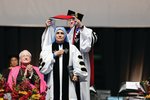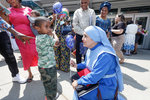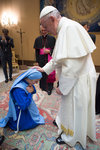


PROVIDENCE — On Sunday, May 15, some fifty thousand people crowded into St. Peter’s Square to celebrate as Pope Francis canonized St. Charles de Foucauld, together with nine other holy men and women from across the globe. The event marked the first canonization Mass since 2019, as well as one of the largest gatherings in Rome since the pandemic. Amid the swirling tide of faces from every corner of our universal church, it would have been easy to overlook the diminutive figure of Mother Olga Yaqob of the Sacred Heart: soft spoken and barely five feet in height, the foundress and mother-servant of the Daughters of Mary of Nazareth draws little attention to herself. That’s generally how she prefers things — meaning that she was understandably a bit hesitant when she first learned that Providence College had selected her to be one of the seven recipients of an honorary doctorate at their recent 104th Commencement Exercises.
“When I was invited to receive this degree, it was a little difficult at first for me to accept,” she explains with a demure smile. “I didn’t feel like I was the one worthy of such an honor — everything in my life has been through grace, both from God and from the people I’ve met and been able to serve. I finally decided to accept the degree on their behalf — to recognize them and tell their stories.”
Despite her reticence, Mother Olga’s own story is certainly one worth telling: her ministry has spanned two continents, weathered four wars, and includes the unique distinction of having founded successful religious orders in two different Christian churches. Like her spiritual model, the newly canonized St. Charles, Mother Olga’s work has been consistently inspired by a devotion to the “hidden life” of Our Lord at Nazareth.
She was born in Kirkuk, a city in the north of Iraq where the predominantly Christian Assyrian population has coexisted for centuries with the largely Muslim Arabs, Kurds, and Turks. “The Iraq of 25 years ago was very different from today’s Iraq,” she recalls. “At that time, there wasn’t widespread extremism like today. You didn’t have ISIS or outside groups like Al-Qaeda; at that time, Iraqis of every religion and race were suffering from the effects of the same wars: the war with Iran, the war with Kuwait, and then the Gulf War.”
Mother Olga witnessed firsthand the carnage caused by these wars, and her first major ministry was helping form Love Your Neighbor, a project which brought Christian and Muslim religious communities together to minister to those affected by the widespread bombing.
“Everyone was so eager to help,” she says. “In some ways, it seemed like the wars brought Christians and Muslims closer together as people. We had all lost children, we had all lost parents. We knew we had to work together to heal our communities.”
Her lay ministry brought her to the attention of her local bishop in the Assyrian Church of the East, who had been looking for suitable candidates for a unique project. Distinct from both the Catholic and the Orthodox faiths (though every bit as ancient, with an apostolic pedigree tracing back to St. Thomas), the Church of the East had gradually lost the monastic tradition shared by its western counterparts. The bishops thought it was time to revive the practice, and had been on the lookout for dynamic young women to become the first Assyrian nuns in seven centuries.
“In the early centuries, we used to have communities known as the ‘Daughters of the Resurrection,’” she explains. “When the faith began spreading through Assyria, women who were not married would often form communities of their own to assist the apostles in spreading the faith, especially in preaching to other women. It grew in the Eastern Rite, and slowly the caves throughout the mountains of Northern Iraq became home to many little monasteries and convents.”
According to Mother Olga, this tradition came to an end during the 14th Century, due to the brutal persecution of Christians initiated by the Emperor Tamerlane.
“The monasteries stood out as very obvious places for them to attack,” she says. “So for their own safety, the bishops ordered all of the monastics and contemplatives to come down from the mountains and live in the villages among the rest of the community. So little by little, the idea of consecrated life was lost to us.”
Restoring a 700-year-old practice did not come without difficulties.
“At first, many of the other Assyrian Christians seemed confused by our presence,” she remembers. “The Church of the East and the Catholic Church had just begun communicating openly again, and Pope John Paul II and our patriarch had just signed a declaration bringing our churches closer together, and many of the people first meeting the Marth Maryam Sisters weren’t sure whether we were part of their church, or the Catholic Church, or some new combination.”
Surprisingly, it was her non-Christian neighbors that sometimes offered the sisters the warmest reception.
“Many Muslim people have a deep love for the Virgin Mary,” says Mother Olga. “One of the chapters of the Qu’ran is the Surah of Maryam. So when they would see us in our blue veils, they would instantly associate us with the Virgin Mary and show us great respect. It was a much simpler time in Iraq.”
As dialogue between the churches continued, Mother Olga eventually found herself converting to the Catholic Church, first through the Chaldean Rite, and finally to the Roman Rite in 2005. She became an American citizen a few years later. It was in the Catholic Church that Mother Olga discovered her personal spiritual inspiration to St. Charles de Foucauld — a man who fully shared her sense of fraternity with people of all faiths and nations.
St. Charles lived among and ministered to the Muslim Tuareg people of Algeria. His preaching often emphasized common points between the two faiths.
“In my own spiritual journey, since I lived in so many parts of the world and served people from many different ethnic backgrounds and ages and states of life, his way of life and his teaching on embracing all humanity has been such an inspiration for me,” she explains. “Saint Charles always used to say, ‘Our hearts, like that of the Church, like that of Jesus, must embrace all humanity.’”
It took many years before de Foucauld’s faith would lead him to Nazareth, however. Starved of the vices and distractions that had characterized his dissipated youth, the young viscount gradually came to realize his own spiritual poverty. Like Augustine before him, Foucauld’s restless heart did not lead him immediately to the Church; freed from the grip of sloth and indulgence, he instead resolved to now “give free rein to the thirst for adventure.”
A series of spiritual revelations eventually led Charles to the confessional of the Église Saint-Augustin — a rather appropriate location for conversion. Today, the church preserves that confessional in their shrine to St. Charles, marking it as the place where his journey to sainthood began in earnest.
For much of his journey, however, de Foucauld seemed to be looking backwards: his spirituality revolves around the notion of returning to the roots of our faith in Nazareth, where Christ spent his hidden life in simplicity and prayer. Love is the ultimate expression of Christlikeness, according to de Foucauld.
“I was so moved by St. Charles and his radical, total commitment to Jesus,” Mother Olga says. “He taught me that imitation is inseparable from love. To imitate Jesus of Nazareth means to love all the way to the end.”
It was this message which Mother Olga thought of when Boston’s Seán Cardinal O’Malley asked her to consider founding a new order in the diocese in 2005. She had gotten to know the Archbishop of Boston during her ministry at Boston University — a period during which her seemingly boundless energy and distinctive Marian habit had earned her the nickname “Blue Lightning.”
At the time, Mother Olga was a nun without an order: although the Sisters of Marth Maryam remains very active (and has recently established a growing presence among fellow St. Thomas Christians in India), Mother Olga had not joined a community since converting to Catholicism.
Working together with the archdiocese, she took several years to develop plans for an order that would adapt the teachings of St. Charles to the needs of Boston’s Catholic community, with the first two sisters making their permanent vows in December of 2019.
“Inspired by his desire to be a universal brother, we felt the call to have a community of universal sisters, helping people see the Church as a family and not an institution,” she recounts. “St. Charles wanted his home to be a place of fraternity and family, which inspired us to call our home and convent ‘little Nazareth,’ so all who come to our home — they can experience the love of Jesus, Mary and Joseph just like the neighbors of the Holy Family did.”
The neighbors served by the Daughters of Mary of Nazareth have included local hospitals and nursing homes, in addition to veteran outreach and addiction ministry. Much of their work has involved childhood cancer patients: during her recent trip to Rome for the canonization of St. Charles, she was joined by a young patient and her family.
“We went with her to Lourdes, and then we were able to get her into a general audience with Pope Francis,” she says. This was not the first time Mother Olga has met with the Holy Father; on the contrary, she had a private audience with him shortly after the foundation of the Daughters of Mary of Nazareth in 2019.
“I had the opportunity to assure him of my prayers for him, and to receive his blessings for me and the Daughters,” she explains. “I also gave him a special prayer card from our community with the Prayer of Abandonment of our patron, St. Charles de Foucauld, to remind him to pray for us and of our prayers for him.”
Abandonment, both for St. Charles and for Mother Olga, means both spiritual surrender to the will of God and a social commitment to those abandoned by society: the sick, the impoverished, and the captive. The final decade of de Foucauld’s life was spent in a hermitage high in the Hoggar Mountains of Algeria, preaching relentlessly against the ongoing practice of slavery in the region.
It was his abandonment to the task of serving God that caused him to remain in the region even after the outbreak of the First World War threatened his safety. In 1916, Sanusi tribesmen allied with the German Army invaded his hermitage and attempted to take de Foucauld prisoner. One of them — a boy of only 15 — was suddenly startled by the approach of French troops and accidentally discharged his rifle, shooting St. Charles through the skull and killing him instantly.
A spiritual focus on Nazareth does not preclude the events of Golgotha. Indeed, care for the dying is a mainstay of Mother Olga’s ministry. In her trip across the stage at Providence College, she brought with her a small plastic star — a token given to her by a childhood cancer patient who has since passed away.
“Danny was eight; he and I used to sit and sing hymns together,” she recalls, her voice occasionally breaking. “Even when he grew too weak to sing with me, he would hum along. Last August, the very last time I saw him, I was singing and could hear him humming along, but couldn’t tell if he was following me or humming a different song.
She recalled leaning in close and over the sounds of the hospital machinery, she could make out that he was humming ‘Twinkle, Twinkle Little Star.’
“So we sang that together for the last time, and I happened to have a small star just like this that I gave him. His family buried him with the star and gave me this similar one to remember him by — and I wrote to them to tell them that I would bring it with me to Providence today, to receive this degree in honor of Danny and all the other children who have suffered from this illness.”
As the familiar strains of “Hail Providence, we praise thy name” filled the Dunkin Donuts Center for the first time since the pandemic, it was particularly appropriate to honor Mother Olga for her work in preaching our dependence on God’s providence.
The special prayer of the Daughters of Mary of Nazareth, authored by St. Charles, expresses rather beautifully the human dependence on the will of God. Originally composed as a meditation on Christ’s words from the cross in the Gospel of Luke, the prayer has since become a spiritual touchstone for the more than 20 religious orders founded upon de Foucauld’s teachings. As it originally appeared in his journals, the opening of the prayer can be translated thus:
“Father, into your hands I commend my spirit. This was the final prayer of our well-beloved Master. May it be ours as well! And may it be the prayer not only of our final moment, but of our every moment: my Father, I commend myself to you; my Father, I put all of my trust in you; my Father, I abandon myself to you. Do with me what you will. Amen.”